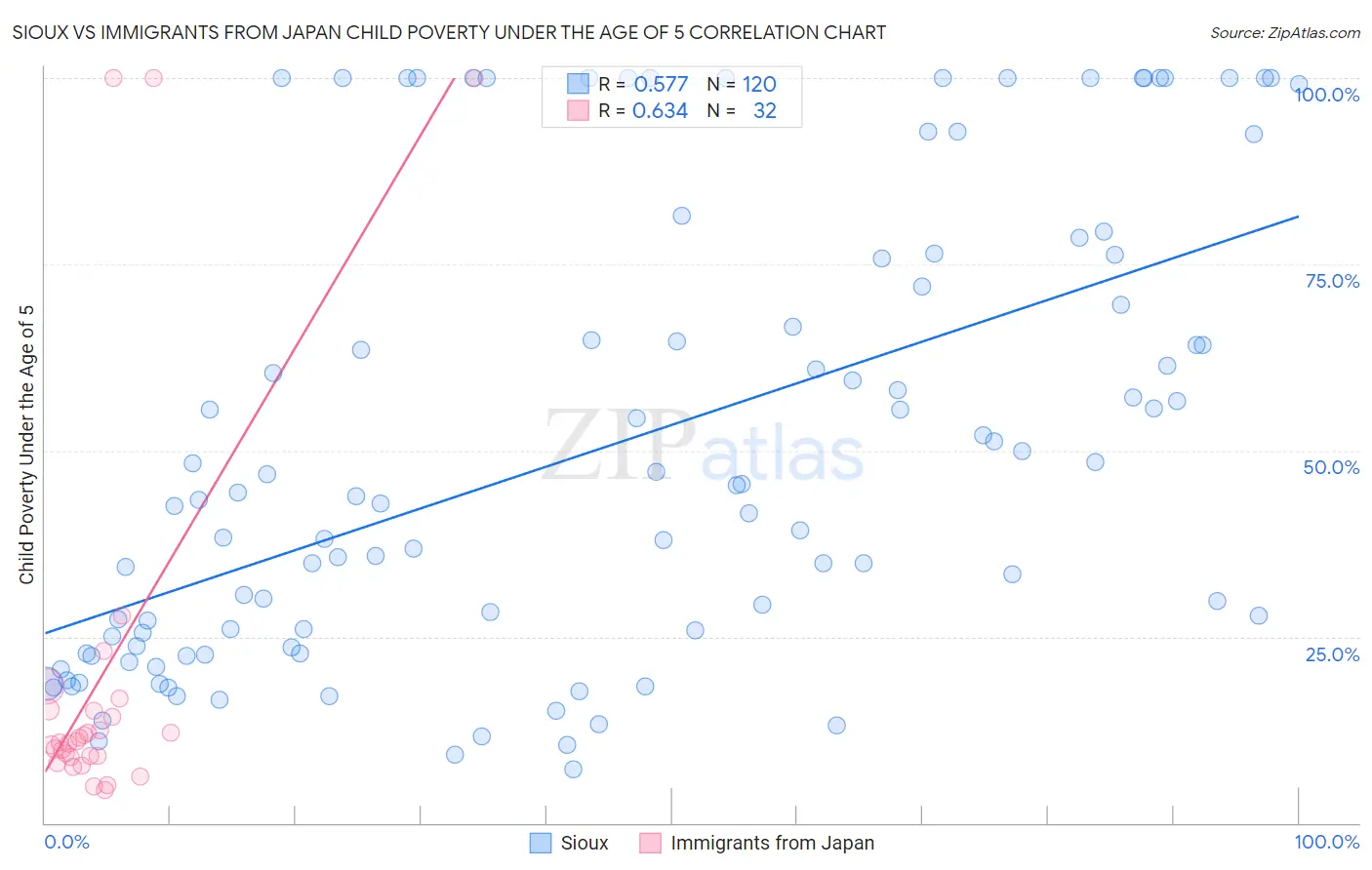Sioux vs Immigrants from Japan Child Poverty Under the Age of 5
COMPARE
Sioux
Immigrants from Japan
Child Poverty Under the Age of 5
Child Poverty Under the Age of 5 Comparison
Sioux
Immigrants from Japan
26.9%
CHILD POVERTY UNDER THE AGE OF 5
0.0/ 100
METRIC RATING
336th/ 347
METRIC RANK
13.8%
CHILD POVERTY UNDER THE AGE OF 5
100.0/ 100
METRIC RATING
20th/ 347
METRIC RANK
Sioux vs Immigrants from Japan Child Poverty Under the Age of 5 Correlation Chart
The statistical analysis conducted on geographies consisting of 228,915,867 people shows a substantial positive correlation between the proportion of Sioux and poverty level among children under the age of 5 in the United States with a correlation coefficient (R) of 0.577 and weighted average of 26.9%. Similarly, the statistical analysis conducted on geographies consisting of 328,132,973 people shows a significant positive correlation between the proportion of Immigrants from Japan and poverty level among children under the age of 5 in the United States with a correlation coefficient (R) of 0.634 and weighted average of 13.8%, a difference of 95.4%.

Child Poverty Under the Age of 5 Correlation Summary
| Measurement | Sioux | Immigrants from Japan |
| Minimum | 7.1% | 4.4% |
| Maximum | 100.0% | 100.0% |
| Range | 92.9% | 95.6% |
| Mean | 50.3% | 19.8% |
| Median | 43.6% | 10.9% |
| Interquartile 25% (IQ1) | 23.7% | 8.9% |
| Interquartile 75% (IQ3) | 73.9% | 15.1% |
| Interquartile Range (IQR) | 50.3% | 6.2% |
| Standard Deviation (Sample) | 30.1% | 26.7% |
| Standard Deviation (Population) | 30.0% | 26.2% |
Similar Demographics by Child Poverty Under the Age of 5
Demographics Similar to Sioux by Child Poverty Under the Age of 5
In terms of child poverty under the age of 5, the demographic groups most similar to Sioux are Pima (27.4%, a difference of 1.9%), Hopi (27.7%, a difference of 2.9%), Yup'ik (27.7%, a difference of 3.0%), Black/African American (25.7%, a difference of 4.9%), and Colville (25.7%, a difference of 4.9%).
| Demographics | Rating | Rank | Child Poverty Under the Age of 5 |
| Cajuns | 0.0 /100 | #329 | Tragic 24.1% |
| Creek | 0.0 /100 | #330 | Tragic 24.2% |
| Kiowa | 0.0 /100 | #331 | Tragic 24.5% |
| Apache | 0.0 /100 | #332 | Tragic 25.0% |
| Natives/Alaskans | 0.0 /100 | #333 | Tragic 25.6% |
| Blacks/African Americans | 0.0 /100 | #334 | Tragic 25.7% |
| Colville | 0.0 /100 | #335 | Tragic 25.7% |
| Sioux | 0.0 /100 | #336 | Tragic 26.9% |
| Pima | 0.0 /100 | #337 | Tragic 27.4% |
| Hopi | 0.0 /100 | #338 | Tragic 27.7% |
| Yup'ik | 0.0 /100 | #339 | Tragic 27.7% |
| Cheyenne | 0.0 /100 | #340 | Tragic 28.3% |
| Immigrants | Yemen | 0.0 /100 | #341 | Tragic 29.3% |
| Tohono O'odham | 0.0 /100 | #342 | Tragic 29.5% |
| Yuman | 0.0 /100 | #343 | Tragic 29.5% |
Demographics Similar to Immigrants from Japan by Child Poverty Under the Age of 5
In terms of child poverty under the age of 5, the demographic groups most similar to Immigrants from Japan are Bolivian (13.8%, a difference of 0.30%), Immigrants from Bolivia (13.8%, a difference of 0.38%), Immigrants from Ireland (13.7%, a difference of 0.40%), Bulgarian (13.9%, a difference of 0.82%), and Immigrants from China (13.6%, a difference of 1.3%).
| Demographics | Rating | Rank | Child Poverty Under the Age of 5 |
| Bhutanese | 100.0 /100 | #13 | Exceptional 13.4% |
| Okinawans | 100.0 /100 | #14 | Exceptional 13.4% |
| Indians (Asian) | 100.0 /100 | #15 | Exceptional 13.4% |
| Immigrants | Eastern Asia | 100.0 /100 | #16 | Exceptional 13.5% |
| Assyrians/Chaldeans/Syriacs | 100.0 /100 | #17 | Exceptional 13.6% |
| Immigrants | China | 100.0 /100 | #18 | Exceptional 13.6% |
| Immigrants | Ireland | 100.0 /100 | #19 | Exceptional 13.7% |
| Immigrants | Japan | 100.0 /100 | #20 | Exceptional 13.8% |
| Bolivians | 100.0 /100 | #21 | Exceptional 13.8% |
| Immigrants | Bolivia | 100.0 /100 | #22 | Exceptional 13.8% |
| Bulgarians | 99.9 /100 | #23 | Exceptional 13.9% |
| Asians | 99.9 /100 | #24 | Exceptional 14.0% |
| Cypriots | 99.9 /100 | #25 | Exceptional 14.0% |
| Immigrants | Lithuania | 99.9 /100 | #26 | Exceptional 14.1% |
| Tongans | 99.9 /100 | #27 | Exceptional 14.2% |